I have a function (see bottom) in PHP, which queries a MySQL database. When I use the following values:
- $map => 1,
- $limit => 10,
- $from => 0,
- $to => CURRENT_TIMESTAMP
With the SQL statement:
SELECT user,
scoreVal AS score,
UNIX_TIMESTAMP(timestamp) AS timestamp
FROM Score
WHERE timestamp >= :from
AND timestamp <= :to
AND map = :map
ORDER BY scoreVal DESC, timestamp ASC
LIMIT :limit
In phpMyAdmin, I get the following result:
However the PHP PDO gets returned an empty array.
My attempts to debug so far:
- I have replaced he prepared SQL query with static values instead of placeholders - Returns correctly
- Trying each placeholder separately, replacing the rest with tested hard-coded values - Returns nothing
- Instead of passing variables to placeholders I pass fixed constants in the execute(Array()) part. - Returns nothing.
- I have furthermore discovered after turning on mySQL query logs, that the PHP client Connects, but then quits without sending any queries.
From this, I believe it to be a problem with the place holders within the function, however I have been unable to find a reason why they are failing. This is most probably occurring on the PHP side, as no errors are being thrown by MySQL to the error file.
This is the function I am using, with the variables being passed in:
- $map => 1,
- $limit => 10,
- $from => 0,
- $to => 0
Function:
/**
* Gets the highscore list for the map in that timespan
* @param integer $map Id of map for which to fetch the highscore
* @param integer $limit Maximum no. of records to fetch
* @param integer $from Timestamp from when to find rank
* @param integer $to Timestamp up to when to find rank
* @return array Array of highscores arranged by rank for the map in the format [{"user"=>$user,"score"=>score,"timestamp" => timestamp}]
*/
function get_highscore_list($map,$limit,$from,$to){
$sql = "SELECT user,scoreVal AS score,UNIX_TIMESTAMP(timestamp) AS timestamp FROM Score WHERE timestamp >= :from AND timestamp <= :to AND map = :map ORDER BY scoreVal DESC, timestamp ASC LIMIT :limit";
if ($to==intval(0)){
$max =1;
$sql = str_replace(":to","NOW()",$sql,$max);
}
try{
$conn = request_connection();
$stmt = $conn->prepare($sql);
$stmt->execute(array(':map'=>$map,':from'=>$from,':limit'=>$limit));
$result = $stmt->fetchAll(PDO::FETCH_ASSOC);
}catch(PDOException $e){
$_POST["exception"]=$e;
continue;
}
return $result;
}
EDITS
Format of MySQL table:
I have tried outputting the $conn->errorInfo();, however as no error is being thrown, I get returned an array of values: [00000,null,null]
The request_connection function only returns the result of this function, and it is working for all of my other statements.
/**
* Creates a new PDO connection to the database specified in the configuration file
* @author Ignacy Debicki
* @return PDO A new open PDO connection to the database
*/
function create_connection(){
try {
$config = parse_ini_file('caDB.ini');
$conn = new PDO('mysql' . ':host=' . $config['dbHost'] . ';dbname=' . $config['db'],$config['dbPHPUser'], $config['dbPHPPass']);
date_default_timezone_set($config['dbTimezone']);
return $conn;
} catch(PDOException $e){
throw new Exception("Failed to initiate connection",102,$e);
}
}
Thanks

